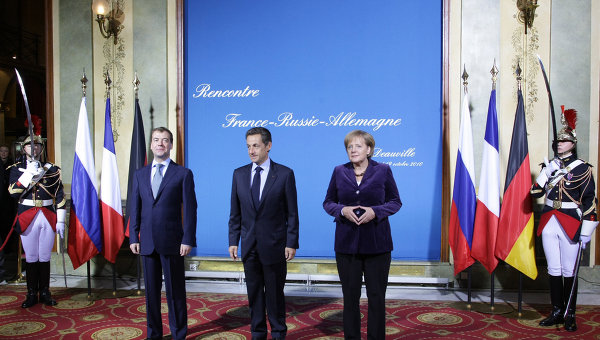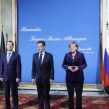
Merkel and Sarkozy Talk Shop with Medvedev
Publication: Eurasia Daily Monitor Volume: 7 Issue: 188
By:

The trilateral summit between French President, Nikolas Sarkozy, German Chancellor, Angela Merkel, and Russian President, Dmitry Medvedev was advertised as an event of greater significance rather than just another cozy get-together. The overnight stay in the French resort of Deauville provided an opportunity for the three leaders to discuss the broadest possible range of issues from the “currency war” to the chaos in Kyrgyzstan before the chain of high-level conferences including the G20 summit in Seoul, Organization for Security and Cooperation in Europe (OSCE) summit in Astana, EU-Russia summit in Brussels, and the NATO summit in Lisbon. What should have made the “troika” meeting special was Sarkozy’s pre-announced intention to offer Medvedev a new kind of partnership that would substantiate Russia’s special position in the European security system (RIA Novosti, October 17; Vremya Novostei, October 18).
This vague proposition aroused suspicions in Washington and some European quarters, but Sarkozy was merely trying to find an elegant way out of the apparent diplomatic deadlock (www.gazeta.ru, October 14). Russia has shown some of its best political behavior this year, from discharging the old tensions in relations with Poland to resolving the maritime border dispute with Norway as well as supporting UN sanctions against Iran. However, its standing in key international institutions has remained underrated. It is still irked by and isolated in the OSCE, and is reduced to the cast of supporting characters in the G20. Meanwhile, its bid for accession to the World Trade Organization (WTO) is far from certain, despite the settlement of all thorny issues with the US. The“reset” of dialogue with the Obama administration has blazed the trail of partnership for Moscow, but now the Prague Treaty on reducing strategic arsenals, a vital diplomatic achievement, is in trouble in the US Senate (Nezavisimoe Voennoe Obozrenie, October 15).
Relations with the European Union, which are supposed to proceed to ever-closer cooperation, are also stagnating, while experts in Moscow are arguing that the escalating discord among the 27 member-states pulled apart by the recession may not necessarily work to Russia’s advantage (www.inosmi.ru, September 29). The EU was quick to suggest the “Partnership for Modernization” program one year ago, but its practical implementation is delayed as the Europeans insist on focusing on corruption problems. In response, Medvedev has given up on this hopeless campaign (www.gazeta.ru, October 13). Last June, Merkel suggested setting up a joint EU-Russia security committee that could target the frozen conflict in Moldova as a start, but the European Commission has been far from enthusiastic about this initiative, which might be quietly discarded by the High Representative for Foreign Affairs, Catherine Ashton.
Even taller hurdles stand in the track of Russia-NATO rapprochement. Moscow had shown little enthusiasm for the dash towards the doctrine-making summit in Lisbon, until Medvedev allowed Sarkozy and Merkel to persuade him to accept the invitation. The disagreements at the recent meeting of foreign and defense ministers over the Alliance’s nuclear strategy were duly noted in Moscow, where arguments for joining NATO in some indefinite perspective remain political heresy (Rossiyskaya Gazeta, October 14). The mainstream point of view is that the much-debated anti-missile system is primarily designed as a shield against Russia, while Iran serves only as a pretext. From the Russian sandpoint, participating in its construction is nonsensical (Ekho Moskvy, October 18; Kommersant, October 19). Discussions about reviving the Conventional Forces in Europe (CFE) Treaty, which Medvedev might entertain in Lisbon, are seen as a convenient way to ensure the fruitlessness of quasi-cooperation since Moscow’s demand for eliminating the “flank limits” remains non-negotiable and unacceptable for the allies, who are not prepared to pretend that Georgia has disappeared from the European map.
Sarkozy is perfectly aware that Medvedev’s draft new treaty for European peace is a non-starter, However, the French President seeks to use the discourse on security “architecture” for developing networks rather than institutions and for creating a position for Russia that would look special without granting any privileges (Nezavisimaya Gazeta, October 19). Moscow wants to have a louder say on security matters than pesky “new Europeans” and to convey its opinions directly to “peers”. Thus, the format of trilateral summits provides exactly such an opportunity. Medvedev has hardly advanced an inch in the question of a visa-free regime with the EU, but he might have received promises to support Russia’s bid to preside over the G20 in 2013.
Both Sarkozy and Merkel are bedeviled by pressing domestic problems, though they found time for a break with Medvedev not in order to recharge batteries but to confirm support for his leadership. He is certainly a disappointment as a “modernizer” yet the prospect of Vladimir Putin taking his third presidential term looks distinctly unpleasant. It will hardly make much difference for the European security climate. However it would signify Russia’s political stagnation, which is worrisome for its neighbors. Medvedev’s diplomatic successes do not, however, impress his senior partner. Putin mentioned to journalists a few weeks ago that foreign policy bored him with too much protocol and that Dmitry Anatolyevich performed in this role just fine (Kommersant, August 31). His top-level networking has always been aimed at translating personal ties into profitable contracts. Therefore, Medvedev is no match for him in this game (Ezhednevny Zhurnal,October18).
The problem for Putin is not anti-missile defense, which he detests as NATO’s ploy for rescuing itself at Russia’s expense, but the money flow. He speaks at one investor forum after another staying on the same message: investments in assets in Russia are safe because he can provide a personal guarantee. The money, nevertheless, continues to flow out. The system of corrupt interpenetration of business and bureaucracy that has emerged as a result of his “manual management” does not take his word anymore as the final verdict. Too many promises have been issued to pensioners, the military, the Skolkovo “wonder-village” and the Olympic construction in Sochi. The stake-holders in Putin’s system of power are squeezed to pay, but cannot take future profits for granted. Russia is not shaken by spectacular protests as in France, where Medvedev has enjoyed his oysters, but the crisis of the elites could be far more dangerous, and Putin’s return to the top table would only make it worse.




